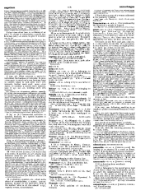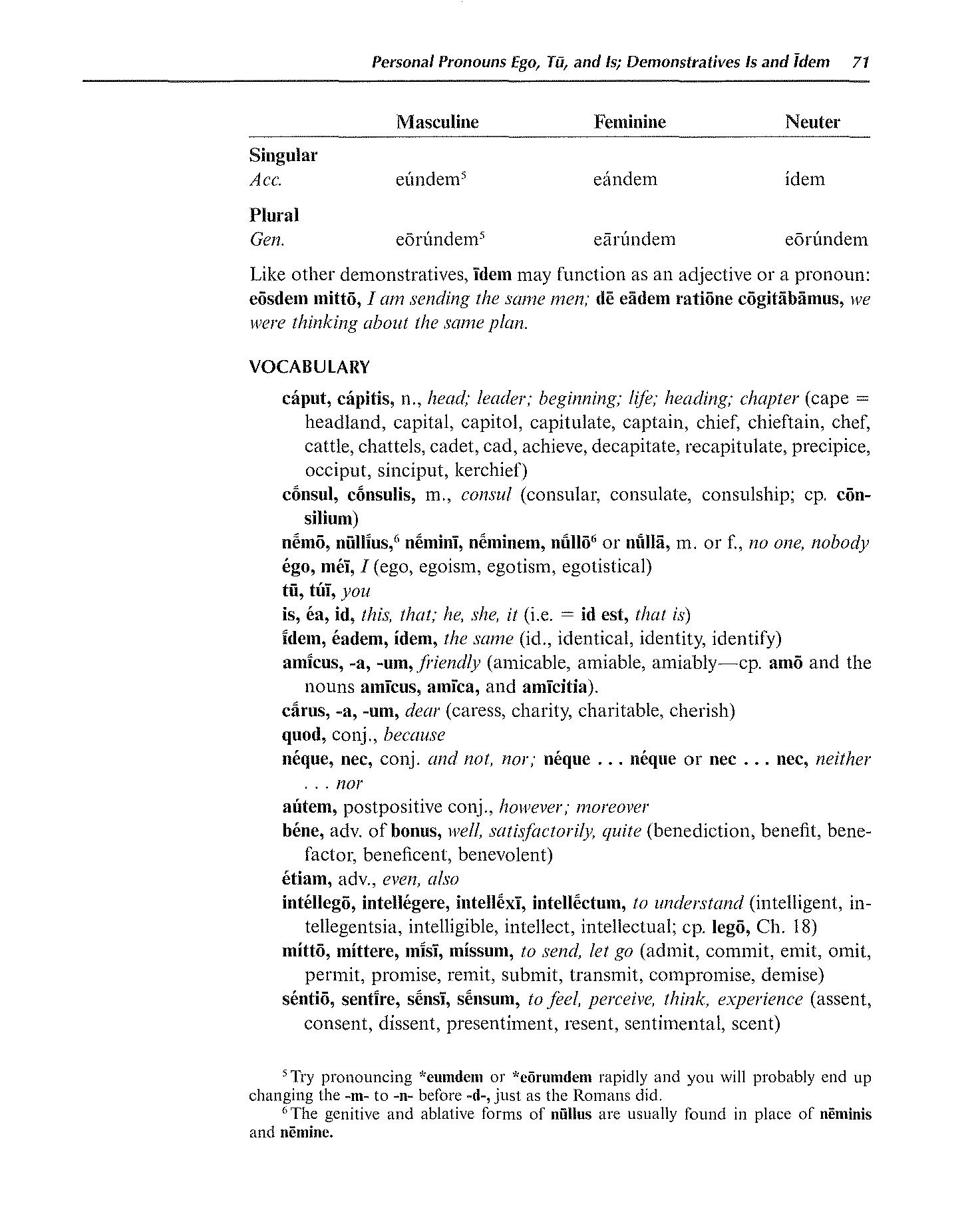
page_listing.tpl
page_subListingDetails.tpl
sub_listingDetails_style1.tpl
sub_listingDetails.title.tpl
nēmō nobody
nēmō is a Latin Noun that primarily means nobody.
Definitions for nēmō
Wheelock's Latin
Noun
- 1
no one, nobody
Oxford Latin Dictionary
Noun
- 1
Nobody. no one. (b) (w. part. gen.; also). (c) no one else. (d) no one whatever. (e) no single person (f) (w. quin). (g) no one yet.
- 2
(sts. written as one wd.), some persons, a few.
- 3
(w. neg., usu. following, resulting in an emphatic positive assertion). Everyone, everybody.
Adjective
- 1
(as adj. with abs. denoting persons) No. (b) ~o non, every.
Sentences with nēmō
Latin to English
Bene sciō mē multa nescīre; nēmō enim potest omnia scīre.Compare I well know that I do not know many things, for no one can know all things.
Tam dūrus erat ut nēmō eum amāret.Compare He was so harsh that no one loved him.
Vir bonus nēminī nocēre vult; omnibus parcit, omnēs iuvat.Compare A good man wishes to harm nobody; he spares all, he helps all.
At nemō erat quī istum hominem turpem dēfenderet.Compare But there was no one who would defend that base fellow.
Nēmō iūdex in causa sua.Compare No one should be a judge in their own cause.
Praestat enim nēminī imperāre quam alicui servīre: sine illo enim vīvere honestē licet, cum hōc vīvendi nūlla condiciō est. (M. Junius Brutus, fragment of De dictatura Pompei)Compare For it is better to give orders to no one than to be a slave to anyone: for without the former it is possible to live honorably, with the latter there is no way of living.
Nemo vos, qui in hic concilium advoco, quisquam dico volo aut audeo.Compare No one of you, who have been summoned to this assembly, wishes or dares to say anything.
Adventus is comprimo Etrusci, adeo ut nemo extra munimentum egredior audeo.Compare His arrival restrained the Etrurians, so completely that no one dared to go beyond the fortifications.
Declension table for nēmō
Cactus2000
| Singular | Plural | |
| Nom. | nēmō | - |
| Gen. | nullī / nullius / nēminis | - |
| Dat. | nēminī | - |
| Acc. | nēminem | - |
| Abl. | nullō / nullā / nēmine | - |
Data sources
Notes
- Definitions
- Frederick M. Wheelock, Wheelock's Latin, 6th ed., rev. Richard A. LaFleur (New York, NY: HarperCollins Publishers, 2005): 71.
- P. G. W. Glare, Oxford Latin Dictionary, Vols. 1-8 (Oxford: Clarendon Press, 1982): 1169.
- Word frequencies
- Christopher Francese, "Latin Core Vocabulary," Dickinson College Commentaries, last modified 2014, http://dcc.dickinson.edu.
- Paul B. Diederich, The Frequency of Latin Words and Their Endings, PhD diss., (Columbia University, 1939).
- Louis Delatte, Suzanne Govaerts, Joseph Denooz, and Etienne Evrard, Dictionnaire fréquentiel et index inverse de la langue latine [Frequency Dictionary and Inverse Index of the Latin Language] (Liège, Belgium: Laboratoire d'analyse statistique des langues anciennes de l'Université de Liège [L.A.S.L.A.], 1981): 120.
Bibliography
Allen, Joseph H. Allen and Greenough's New Latin Grammar for Schools and Colleges: Founded on Comparative Grammar. Edited by James B. Greenough, George L. Kittredge, Albert A. Howard, and Benjamin L. D'Ooge. Boston, MA: Ginn & Company, 1903.
Crystal, David. A Dictionary of Linguistics and Phonetics. 6th ed. Oxford, UK: Blackwell Publishing, 2008.
Delatte, Louis, Suzanne Govaerts, Joseph Denooz, and Etienne Evrard. Dictionnaire fréquentiel et index inverse de la langue latine [Frequency Dictionary and Inverse Index of the Latin Language]. Liège, Belgium: Laboratoire d'analyse statistique des langues anciennes de l'Université de Liège (L.A.S.L.A.), 1981.
Diederich, Paul B. The Frequency of Latin Words and Their Endings. PhD diss., Columbia University, 1939.
Francese, Christopher. "Latin Core Vocabulary." Dickinson College Commentaries. Last modified 2014. http://dcc.dickinson.edu/latin-vocabulary-list.
Gildersleeve, Basil L., and Gonzales Lodge. Gildersleeve's Latin Grammar: Third Edition, Revised, and Enlarged. 3rd ed. London, England: Macmillan and Co., 1903.
Glare, Peter G.W. Oxford Latin Dictionary. Vols. 1-8. Oxford, England: Clarendon Press, 1982.
Krüger, Bernd. "Latin Conjugation Tables." Cactus2000. Accessed May 5, 2023. https://latin.cactus2000.de/index.en.php.
Pierson, Nick. "Sound of Text." Accessed October 26, 2019. https://soundoftext.com.
Wheelock, Frederick M. Wheelock's Latin. 6th ed. Revised by Richard A. LaFleur. New York, NY: HarperCollins Publishers, 2005.
Wiktionary Contributors. "Victionarium." Wikimedia Foundation, Inc. Updated March 18, 2019. https://la.wiktionary.org/wiki/Victionarium:Pagina_prima.
Citation
Chicago (17th ed.)
Allo Contributors. "nēmō, nullius, nēminī, nēminem, nullō, nullā (n.) - Latin Word Definition." Allo Latin Dictionary. Last modified . Accessed February 20, 2026. http://ancientlanguages.org/latin/dictionary/nemo-nulli-nullius-neminis.
Entry created on . Last updated on .







